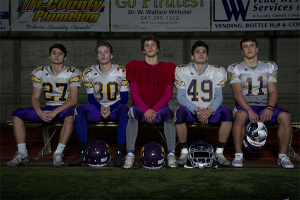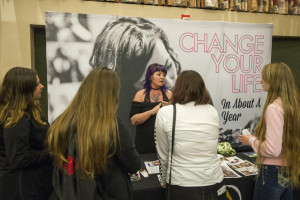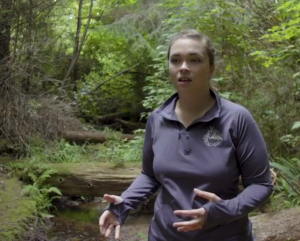A federal grant will help the Coquille Tribe’s Community Health Center connect patients with specialists hundreds of miles away. See media reports:
Author: Tim Novotny
Pirate Pride

Marshfield High School’s football time was eliminated in the state semifinals. But not before the local newspaper celebrated Native American participation on the team — including three Coquille Tribe members.
Tribe Helps Teens Connect With Their Futures

Hundreds of Coos County teens connected with colleges, vocational schools and employers at the Coquille Tribe’s third annual College and Career Fair. See below for local media coverage.
A Coho Homecoming
In a Nature Conservancy video, Coquille Tribal biologist Helena Linnell talks about the Working Landscapes project, which is restoring salmon habitat in the Coquille Valley. View video
You can read the story of a historic moment —the day when the gates opened to restore tidewaters that had been absent for more than a century. Click here to read
Learn more about the tidelands project on the Working Landscapes website. Click here
Develop SB13 Coquille Indian Tribe Culture Curriculum
Contact/Questions: Please Email your questions to Bridgett Wheeler Culture, Education, and Learning Services Director [email protected]
**RFP due date 5:00PM on October 26, 2018
Email electronic copies of proposal to:
Bridgett Wheeler [email protected]
Arlea Grenade [email protected]
RFP DEVELOP SB13 COQUILLE INDIAN TRIBE CULTURE CURRICULUM
CONTRACT-1-for-Services-MAIN-06-2016
Coquille Tribe Receives Quarter-Million in Grant Funding
The U.S. Justice Department on Thursday (Sept.20, 2018) announced the award of more than $4.8 million in grants to six American Indian tribes in Oregon and one tribal commission. The Coquille Indian Tribe is set to receive $268,425 for its four-officer police department.
UO anthropologists aid effort on Native American artifacts

Coquille Tribal member Jason Younker, a cultural anthropologist at the University of Oregon, is part of a team that’s developing state guidelines for managing Native American artifacts. Read the story
Mill-Luck Salmon Celebration

For details about the 2018 Mill-Luck Salmon Celebration scroll down the Entertainment page of The Mill website:



